|
|
|
Sort Order |
|
|
|
Items / Page
|
|
|
|
|
|
|
| Srl | Item |
| 1 |
ID:
164148
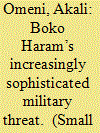

|
|
|
|
|
| Summary/Abstract |
This paper evaluates Boko Haram’s military capabilities and details the process of how its standing army, driven by these capabilities, came to pose a phased threat between 2013 and 2015 in particular. This was a period when military fighting dominated the insurgency in north-east Nigeria. Whereas there is an abundance of literature on Boko Haram’s histories and the impact of its insurgency on north-east Nigeria, analysis of Boko Haram’s military campaigning is still deficient. Attempting to fill this gap, this paper uses field findings and battlefield case studies from north-east Nigeria to highlight how Boko Haram’s overt front – its standing army – came to supplant its guerrilla operations as the main security threat to the frontier area.
|
|
|
|
|
|
|
|
|
|
|
|
|
|
|
|
| 2 |
ID:
164150
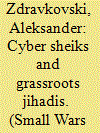

|
|
|
|
|
| Summary/Abstract |
What was the scope of the Bosnian jihadi participation in the war in Syria? Did the Bosnian volunteers tend to join one particular faction? Why did the Bosnian youngsters decide to join the holy war in the Levant? Was this an organized and hierarchical process or was this a grassroots movement? Last, were all the Salafis in Bosnia supportive of this dynamic or did this process cause internal frictions? These are some of the questions that this research will try to answer.
|
|
|
|
|
|
|
|
|
|
|
|
|
|
|
|
| 3 |
ID:
164152
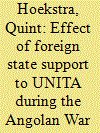

|
|
|
|
|
| Summary/Abstract |
State support for foreign rebel groups has become more salient, yet it remains unclear how this affects armed conflict. This paper therefore analyses the effect of foreign government assistance and does so in the typical case of the Angolan War (1975–1991). It argues that South African and United States support greatly helped the National Union for the Total Independence of Angola (UNITA) wage a large and sustained insurgency campaign but was ultimately insufficient to overthrow the People’s Movement for the Liberation of Angola (MPLA) government because it enabled the incumbent government to obtain similar foreign assistance and because the level of aid awarded to UNITA fluctuated strongly, preventing it from engaging in meaningful long-term planning.
|
|
|
|
|
|
|
|
|
|
|
|
|
|
|
|
| 4 |
ID:
164149


|
|
|
|
|
| Summary/Abstract |
In May 2018, the Basque insurgent group Euskadi Ta Askatasuna (ETA) officially disbanded after a 60-year struggle. This inquiry assesses ETA’s violent campaigns using recent conceptual and theoretical advancements from the field of terrorism studies. Three conclusions concerning the group’s strategies of terrorism are advanced. First, ETA regularly targeted civilians to achieve goals other than coercing the Government of Spain; these objectives included outbidding rival separatist groups and spoiling negotiation processes. Second, ETA’s most rapid period of organizational growth occurred as the result of an aggressive terrorist campaign, demonstrating that civilian targeting can serve as a stimulus to rebel group recruitment. Finally, while terrorism did not advance ETA’s primary political objective of creating an independent Basque state, it did enable the group to assume a leading position within the radical Basque separatist movement, helping extend ETA’s lifespan and making the group an embedded actor within the contentious political processes surrounding the question of Basque self-determination. Collectively, these conclusions support recent theoretical findings arguing that non-state terrorism often enables insurgent groups to prolong their lifespans while paradoxically making it more difficult for them to advance their long-term political objectives.
|
|
|
|
|
|
|
|
|
|
|
|
|
|
|
|
| 5 |
ID:
164151


|
|
|
|
|
| Summary/Abstract |
The practice of dispatching teams of police advisors to other states to build or train foreign security forces began at the end of the nineteenth century, yet there exists no definitive history of the practice, or any definitive theoretical approach underpinning why such missions succeed or fail. Drawing upon their recent edited book on expeditionary police advising, and by examining the donor or sending states, the host nations, and the use of police in counterinsurgency situations, the authors present some key reasons why such missions fail, and lay some groundwork for additional study of this important subject.
|
|
|
|
|
|
|
|
|
|
|
|
|
|
|
|
| 6 |
ID:
164154


|
|
|
|
|
| Summary/Abstract |
Sectarian militants have for years launched attacks from Pakistan across the border to Iran. Finding sanctuary in a neighbouring country can make the difference between success and failure for militants. Conventional wisdom holds that a lasting transnational militancy challenge would typically create serious interstate conflict. Militancy has triggered armed encounters between Iran and Pakistan. This article argues that despite some tension militancy has resulted in deeper cooperation in the ambivalent dyad. Both states’ overarching security concerns, having exhausted other options, the believed involvement of third-party states, and economic potential, have moderately alleviated negative pressure caused by militancy.
|
|
|
|
|
|
|
|
|
|
|
|
|
|
|
|
| 7 |
ID:
164146
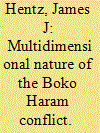

|
|
|
|
|
| Summary/Abstract |
The debate concerning the Nigerian terrorist Boko Haram is typically simplified across two false dichotomies. First, it is treated as either a local conflict in northeast Nigeria with its epicentre in Borno State or part of a broader conflict in Northwest Africa (and beyond), encompassing northern Cameroon, southern Chad, Niger, and reaching into Libya and Mali. The second dichotomy concerns whether it is animated by local material conditions on the ground, or is part of a broader anti-West jihad. The Boko Haram insurgency is not that simple. It is, rather, a multidimensional conflict and can change overtime.
|
|
|
|
|
|
|
|
|
|
|
|
|
|
|
|
| 8 |
ID:
164153
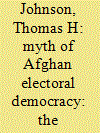

|
|
|
|
|
| Summary/Abstract |
This article systematically assesses the 2014 Afghanistan Presidential Election, the first transfer of power from President Hamid Karzai to an elected successor, using provincial voting data as well as explicit data from polling centers. The analysis finds unusual voting results in the April election, where no candidate received 50%+1 votes required by the Afghan constitution, versus the voting results realized for the June ‘runoff election.’ As in other Afghan voting analyses, this article finds voting based on ethno-linguistic preferences, and interestingly found Dr. Ashraf Ghani receiving almost all the swing votes in the runoff election even though the other leading candidate from the April election all endorsed Dr. Abdullah Abdullah. More importantly, however, the research presented here clearly finds extremely strange voting patterns. For example, the polling data center analysis finds 606 polling places where Ghani received all 600 votes and Abdullah received none and another 900 polling centers that gave virtually all its votes to Ghani. These results in combination with other analyses raise the very real possibility that the election results were illegitimate. The article concludes with a discussion of the implications of the research to future Afghan elections and their processes as well as to the long-standing conflict in the country.
|
|
|
|
|
|
|
|
|
|
|
|
|
|
|
|
| 9 |
ID:
164147
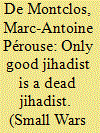

|
|
|
|
|
| Summary/Abstract |
This article discusses the shortcomings of the “de-radicalization doctrine” in sub-Saharan Africa. The issues raised are illustrated by the war against Boko Haram, which involves Nigeria, Niger, Chad and Cameroon. Relying on interviews with security officers, insurgents, civil servants, displaced people, humanitarian workers and Muslim and Christian clerics in Nigeria, Niger and Chad since 2005, the investigation shows that the four states focused on repression rather than demobilisation programs in prison or outdoors. The Boko Haram crisis is mainly a story of mismanagement. The article thus challenges the assumptions of the “de-radicalization doctrine” in Muslim Africa South of the Sahara. First, attempts to de-radicalize jihadi terrorists tend to focus too much on religious fanaticism and the exegesis of the Quran. Secondly, they are neither feasible nor efficient. Finally, they obscure priorities that are more important to counter extremism and demobilize insurgents.
|
|
|
|
|
|
|
|
|
|
|
|
|
|
|
|
|
|
|
|
|